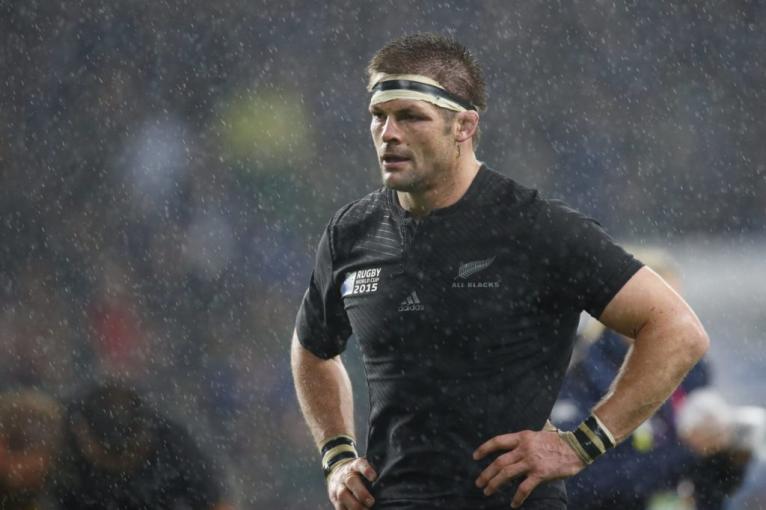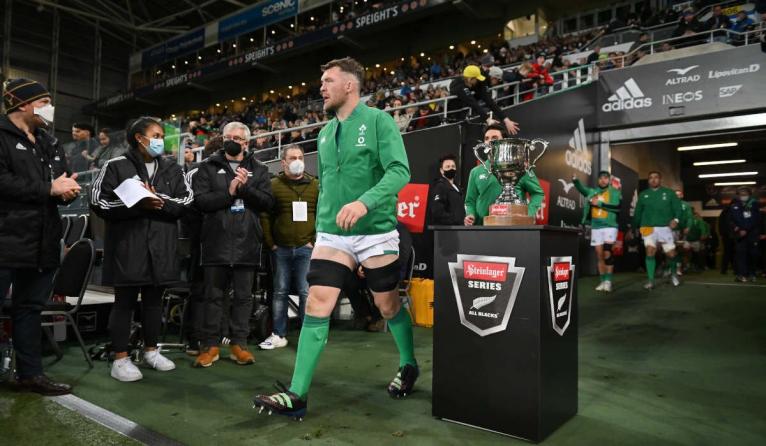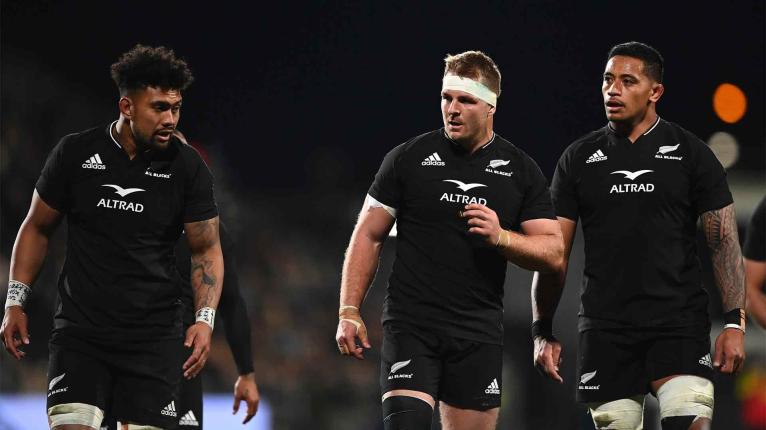Last July wasn’t a happy time for the All Blacks. And it certainly wasn’t a happy time for captain Sam Cane, who came in for an unusually high volume of criticism from his own public, and famously so from Irish flanker Peter O’Mahony.
Cane, since he was appointed captain by coach Ian Foster in early 2020, has never been a universally popular choice.
He’s a likeable guy, and a good player, but in the eyes of many New Zealanders, he doesn’t embody the indefatigable spirit they expect from both the All Blacks openside flanker and indeed the captain.
It’s a tough old business being captain in New Zealand where the public expect the skipper to be almost superhuman. That’s partly due to the mythology of the All Blacks, and because a handful of captains have set the bar ridiculously high – think here, specifically, Richie McCaw, Sean Fitzpatrick, Buck Shelford and Brian Lochore.
These men were great players and great leaders and all those who follow in their footsteps are held to deliver the standards they set.

And this has been the problem for Cane: he’s never quite captured the imagination as a dashing No 7. Mostly because he’s not that type of player and his game is built on the strength of his defence.
He’s more a six-and-a-half than he is a seven and while his warrior spirit is inspirational to his team-mates and highly valued by his coaches, it’s not so easy for the public to appreciate, and when the All Blacks lost the Test series to Ireland last year, 2-1, there were widespread calls for Cane to be dropped.
These came from former All Blacks, journalists, pundits and most notably, from Stuart Barnes, with the former England first five-eighth writing in The Times, after the first test, that: “Sam Cane may be a fine leader of rugby players, but he is not good enough to play for the All Blacks.
“Yes, Cane works hard. He makes his share of tackles but none of them are destructive. They are the sort of tackles that, frankly, any professional openside should make.
“If New Zealand are to find their best back-row blend before next year’s World Cup, the hard call has to be made, with Cane relegated to the bench or jettisoned completely.
“This win could be a launchpad to greater things if the management has the courage to act.
There was so much negative noise around Cane going into the second Test, that O’Mahony couldn’t resist taking the opportunity to tell the All Blacks captain that he was “a shit Richie McCaw”.
“Cane may be New Zealand’s unsung hero. The trouble is, there is simply not enough to sing about.”
It was a harsh critique by Barnes, over the top certainly, but tinged with some undeniable truths. Cane was battling to prove he was worthy of his starting spot in the All Blacks.
He wasn’t pitching in with much ball carrying, his turnover work was okay but the numbers he pulled off were not huge and there was this sense that the All Blacks weren’t quite behind him in his leadership.
There was so much negative noise around Cane going into the second Test, that O’Mahony couldn’t resist taking the opportunity to tell the All Blacks captain that he was “a shit Richie McCaw”.
It was a sledge that went around the world and when Ireland won the series in Wellington, the most poignant memory was not them celebrating what was such a special achievement, it was the sight of Cane being substituted by his own coach with 15 minutes to play.

It was a hugely symbolic moment because the game was still in the balance. The All Blacks were still in the game when he went off, trailing 25-22 with some momentum behind them.
But seeing him come off seemed like an admission by head coach Ian Foster that he didn’t have any faith in the attacking skills of his captain or his ability to inspire the team to force their way back from behind.
Such was the sense of lost hope that one newspaper wrote that it believed Cane was going to be dropped after the Irish series and left behind when the team went to South Africa.
The paper was wrong, but it certainly was a believable story. But 15 months on, Cane is still Foster’s preferred openside flanker and he’s still Foster’s captain.
And not only that, but public resistance to Cane has lessened because since that Irish series, he’s found a bit of form, both for the All Blacks and the Chiefs and demonstrated his value to the team.
It’s not just that Cane is in better form than he was a year ago, he’s also part of a better balanced backrow now that Shannon Frizell has seemingly come of age and found himself on the blindside.
Cane gave world class performances in the Rugby Championship defeats of Argentina and South Africa and was again at his bruising best when the All Blacks beat the Wallabies at Eden Park.
But a back injury saw him miss the games against France and Namibia and hence, the All Blacks were eager to get him back on the track, with Cane playing 30 minutes against Italy and then starting against Uruguay where his work rate was enormous.
And their eagerness to get their captain back was understandable. It’s not just that Cane is in better form than he was a year ago, he’s also part of a better balanced backrow now that Shannon Frizell has seemingly come of age and found himself on the blindside.
Cane, Frizell and Savea are bringing out the best out in each other, with the former being well utilised as a ball carrier in thick traffic.
Cane isn’t necessarily a great open field runner, but he does use his footwork well and strength to crunch that metre or two when the All Blacks are trying smash their way forward close to the ruck.
Cane has found a role in the gameplan that works better for him, and the All Blacks tight five have grown immeasurably in cohesion and effectiveness since the Irish series last year.

Their set-piece work is vastly improved – particularly their scrummaging – and the intensity with which they carry the ball and recycle is unrecognisable to their work in July last year.
But the real kicker in all this improvement, it that it has empowered Savea to play his natural game of getting that bit wider and using his incredible pace and athleticism to damage teams.
Savea, has been menacingly good all year, and he was man of the match against Italy, leading Foster to say: “When we give Ardie a platform to play and we can get him going forward and he can get that linking game and that carry game going that’s his element.”
And so too has Savea grown as a leader – captaining the team three times this year – which has taken some of the pressure off Cane as a decision-maker.
“We’ve got a good relationship,” says Cane. “We’ve played a lot of footy together and there’s a huge amount of trust between us. We’ve got slightly different leadership styles, but getting us back in the team together, we’ll complement each other well.
Ireland may find that they are about to meet an entirely different version of the All Blacks.
“He’s a lot more comfortable in the role now, and he showed that by how he led, and also how he played last weekend. We’re always learning off each other.”
All of which means Ireland may find that they are about to meet an entirely different version of the All Blacks and a rejuvenated Cane who is a much better player and captain than he was the last time the two sides met.
O’Mahony was certainly the dominant figure in July 2022, but his sledge might come back to haunt him as whatever Cane is, he is not a shit version of Richie McCaw and the All Blacks captain and his teammates don’t lack motivation to prove that in the World Cup quarter-final.
The stage is certainly set for Cane to exact a cold and satisfying revenge by delivering his best rugby in Paris as part of an All Blacks team felt the full pain of that series defeat to Ireland last year and has totally reconstructed itself in the 15 months since.
The great symbolism of that series was a dejected Cane leaving the field in Wellington with 13 minutes left to play, but perhaps in Paris, the image that may reverberate around the world will be of disillusioned and shell-shocked Irish players trying to work out how the All Blacks got so much better.



Peter O'Mahony showed his complete lack of class when he called Cane a shit McCaw…
I THINK IRELAND WILL BEAT THE ALL BLACK'S.THE TEAM FOSTER AND HIS ASSISTANT COACHES PICKED IS NOT A WINNING TEAM AGAINST IRELAND.THATS JUST ME BUT WHY WOULD YOU HAVE SAM CANE, TAYLOR, SCOTT BARRETT STARTING.I LIKE CHRISTIE BUT NO ROIGARDE.
It tells you something about this AB team that their Captain is the best 7 in the country and will fail to make any of the top 4 teams, that goes for the centres, props and maybe 1 wing. That makes 7 out of 15. No pressure at all
At the end of the day, we lose a lot with Cane not there. Ardie has never been a like for like and we struggle with him at 7.
Frizell and Cane do all the work to let Ardie be another back.
No matter what happens, Ardie should have been playing 7 for the last 4 years. Feel for Whitlock who should have been captain last 4 years, can't wait till Foster and the suits who hired him are gone. Just look what they have done to ABS brand.
Reading all the comments I am surprised at some of the AB supporters negativity towards their own team. Cannot blame Cane for previous losses. All teams take a dip. ABs on their way up again. Bok supporter
I know that a lot gets said during a rugby match but have always felt that O'Mahoney's comment somehow crossed the line and that it would some day come back to bite him. It might just be this Saturday. Bok supporter.
Still hope for a Bok Vs AB final. May it happen.
"It's time for Sam Cane to strike back" Hehehehe best one mate hehehahahaha in your dreams
The main issue with Cane has been the number and seriousness of his injuries. He was a world class player before his life threatening neck injury, he came back a shadow of his former self. He used to be a Tasmanian devil flying around the field smashing anything that moved. Following that injury, probably rightly, he became more conservative. But he no longer performed the role that made him great. He has gotten bigger and stronger, and is a very strong tackler, but those things are table stakes to be world class loose forward.
Every subsequent injury, usually leading to weeks off at time, has seen him come back a yard slower and a split second more hesitant.
It was always unfair to compare him to mcCaw because they are different players and likely no one will ever fill those boots, but it is fair to compare him to JVDF, Ollivon, Kwagga Smith, Kolisi, Curry, and even Jac Morgan. I can't say I would select Cane over any one of those players.
IMO Foster did him an enormous disservice by continuing to select him when he was not playing well. Look at Frizzell - he was dropped a number of time and has come back an absolute powerhouse filling the exact role we needed. The years of injuries have taken their toll on Cane but he is a good player and could have undergone a similar transformation given the opportunity and incentive.
I thought Peter O'Mahony quote was "you're not even a shit Richie McCaw",